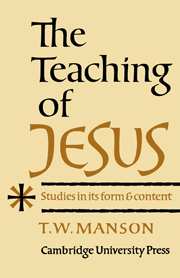Book contents
- Frontmatter
- Contents
- Preface
- LIST OF ABBREVIATIONS
- PART I PRELIMINARY QUESTIONS
- PART II THE CONTENTS OF THE TEACHING
- Chap. IV God as Father
- Chap. V God as King
- Chap. VI God as King: The Eternal Sovereignty
- Chap. VII God as King: The Kingdom in the World
- Detached Note C. The Terms ‘Disciple’ and ‘Apostle’
- Chap. VIII God as King: The Final Consummation
- Chap. IX Religion and Morals
- Detached Note D. On Mk x. 42–44
- Detached Note E. On Mk vii. 6–13
- Appendices I–VI
- Additional Notes
- General Index
- Reference Index
Chap. VI - God as King: The Eternal Sovereignty
Published online by Cambridge University Press: 31 March 2010
- Frontmatter
- Contents
- Preface
- LIST OF ABBREVIATIONS
- PART I PRELIMINARY QUESTIONS
- PART II THE CONTENTS OF THE TEACHING
- Chap. IV God as Father
- Chap. V God as King
- Chap. VI God as King: The Eternal Sovereignty
- Chap. VII God as King: The Kingdom in the World
- Detached Note C. The Terms ‘Disciple’ and ‘Apostle’
- Chap. VIII God as King: The Final Consummation
- Chap. IX Religion and Morals
- Detached Note D. On Mk x. 42–44
- Detached Note E. On Mk vii. 6–13
- Appendices I–VI
- Additional Notes
- General Index
- Reference Index
Summary
PRE-PROPHETIC AND PROPHETIC IDEAS
THE eternal and absolute sovereignty of God was an integral part of .the religious heritage of the people among whom our Lord lived and worked. It was in their sacred Scriptures; it was in their synagogue discourses; it was implied in their daily prayers. In prophetic vision Isaiah had seen the Lord sitting upon a throne high and lifted up. Micaiah ben Imlah saw the Lord sitting on his throne, and all the host of heaven standing by him on his right hand and on his left. The prophetic ministry of Ezekiel was inaugurated by the vision of the thronechariot of Jehovah. In all these the essential idea is the same, that the sovereignty of God is universal and absolute; and in Ezekiel's vision this absoluteness and universality are pressed to the utmost limit. The Kingship of Jehovah is independent of his special relation to Israel and the fall of Israel leaves his essential sovereignty untouched. ‘On the whole the tendency of Ezekiel's vision…is to emphasise the universality of Jehovah's relations to the world of nature and of mankind.… The attributes of God here symbolised are those which express His relation to created existence as a whole–omnipresence, omnipotence, omniscience.' And this vision of God as King, which had been the inspiration of the great prophets, had in the days of Jesus become an article of faith to every pious Jew.
- Type
- Chapter
- Information
- Teaching of Jesus , pp. 142 - 170Publisher: Cambridge University PressPrint publication year: 1935

